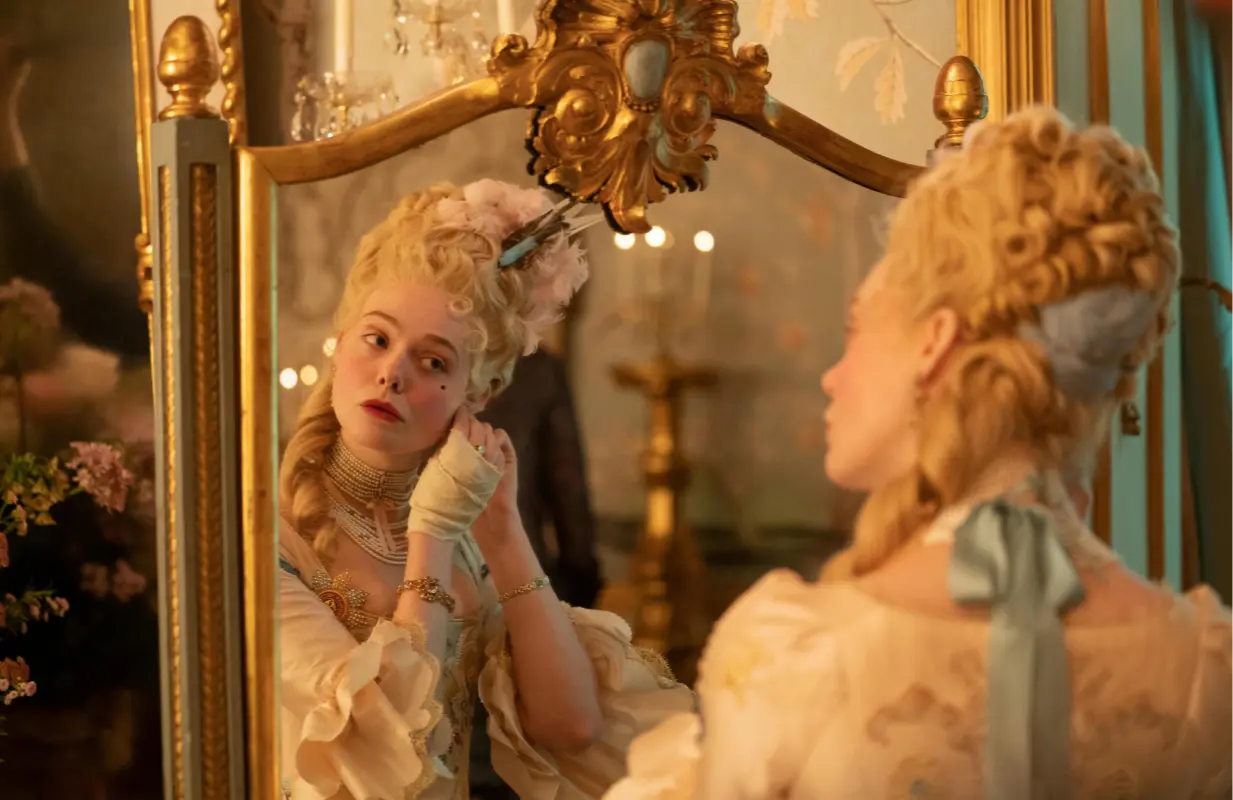Radical Changes Are Good For Hulu's The Great
-
 Elle Fanning in Season 3 of The Great (Photo: Christopher Raphael/Hulu)
Elle Fanning in Season 3 of The Great (Photo: Christopher Raphael/Hulu)Once a fish-out-of-water comedy about a bright-eyed young woman thrown into the messy, violent world of the Russian monarchy, Hulu’s The Great has morphed into a genre-bending power struggle for the throne. With a coup squarely in the rearview mirror, Season 3 shifts to explore Catherine (Elle Fanning)’s contradictory desires: She wants to bring change to her country; she wants to maintain her connection to her husband, Emperor Peter (Nicholas Hoult); and she needs to feed her own ego. Because all her motives are defined by power, they all have an inherent darkness, and the show thrives by embracing it. Though The Great is still recognizable to anyone who’s been watching for years, this shift helps Season 3 become something unexpected and incredibly powerful.
The changes are apparent from the beginning, since for the first time, the show picks up with Catherine and Peter decidedly not at each other’s throats. Where Season 1 saw Catherine plotting a coup and Season 2 followed the ensuing power struggle, Season 3 opens on the duo acting as a united front. They’re closer than ever, even if they’re still struggling to reconcile their similarly volatile personalities.
This is gratifying because it gives the show time to explore the other fascinating dynamics at court. In the first two seasons, there was an unspoken expectation that because they initially supported her, the nobles and power players in Catherine’s corner would remain loyal, but this is nowhere near the truth. The new episodes simmer with the possibility that anyone might be willing to stab her in the back.
For instance, Catherine’s lady-in-waiting Marial (Phoebe Fox) is pushed to her limits when she’s forced to reconcile her feelings for Peter’s friend Grigor (Gwilym Lee), her loyalty to Catherine, and her empathy and love for the serfs she once lived and worked with. Marial’s 11-year-old husband/nephew Maxim (Henry Meredith) is also a delightful scene stealer: His ridiculous affinity for fine shoes and over-eagerness to be taken seriously are a frequent well for comedy, but he’s also got a protectiveness towards Marial that makes him incredibly endearing.
Meanwhile, Aunt Elizabeth (Belinda Bromilow) reveals rich new textures. In past seasons she’s toed a curious line between comic relief and strategic mastermind, but this season, her affection for both Peter and Catherine is more thoroughly explored, as well as her lingering grief from the death of her son and her lost love, Peter II. Once she makes a power grab that forces her to directly challenge Catherine, she reveals the stone-cold ruthlessness beneath her cheery façade, and Bromilow’s ability to flick between amusement and viciousness makes the character’s unpredictability all the more believable and frightening.
Even within these rich stories, however, some characters still feel shoehorned into the series: Florence Keith-Roach and Bayo Gbadamosi’s social-climbing aristocrat couple Tatyana and Arkady are particularly expendable. Their story is tied to Peter’s doppelganger Pugachev and his attempts to rally a revolution against Catherine, but they’re still the same disloyal, opportunistic second-fiddles they’ve always been. Freddie Fox and Grace Molony as the King and Queen of Sweden have also overstayed their welcome, still squatting in the Russian palace after Sweden was overrun by a rebellion.
But of the many courtiers, it’s the bookish, pragmatic Count Orlo (Sacha Dhawan) who’s most underserved. Despite being a key player in earlier seasons, he’s taken in a bizarre, frustrating, and borderline disrespectful direction. Fans are likely to recognize the disheartening developments as soon as they arrive.
Still, The Great balances these missteps with several bold narrative twists that force Catherine to re-examine herself. While the first five episodes of Season 3 are on par with what we’ve come to expect from the show, the latter half is an ambitious endeavor — especially Episode 8, which is perhaps the single strongest entry in the series so far.
It’s in the back half of the season where we see the full depth and range of Elle Fanning’s performance. She’s always made Catherine’s bizarre dialogue and often frustrating personality effortlessly charming and endearing, but the strength of the writing gives her the opportunity to shine as Catherine’s darker side emerges. (For the first time, series creator Tony McNamara writes or co-writes every episode of the season.)
In some respects, Catherine has been privileged, sheltered from the opinions of the public by people like Marial and Elizabeth. But as she grows in power and asserts her rule, she gets a bitter taste of what her subjects actually think of her, and it’s not a revelation she handles well. Fanning gives the character a startling, haughty dismissiveness — particularly in her frequent clashes with Marial, where her low blows feel particularly personal. And to her great credit, Fanning still communicates Catherine’s innocence and inexperience, even as she tries to be more severe. As with the death of Catherine’s mother last season, Fanning plays this season’s losses with palpable vulnerability. Between her quiet, vacant stare and the trance-like way she walks, it’s a full-body performance that continues to steer The Great toward its most effective, memorable moments. After all, her light and dark sides control the shadows across an entire empire.
The Great Season 3 premieres May 12 on Hulu. Join the discussion about the show in our forums.
Lauren Coates is a Chicago-based film critic & entertainment journalist. A regular contributor at The Mary Sue, she's also a member of GALECA and the Chicago Film Critics Association.
TOPICS: The Great, Hulu, Elle Fanning